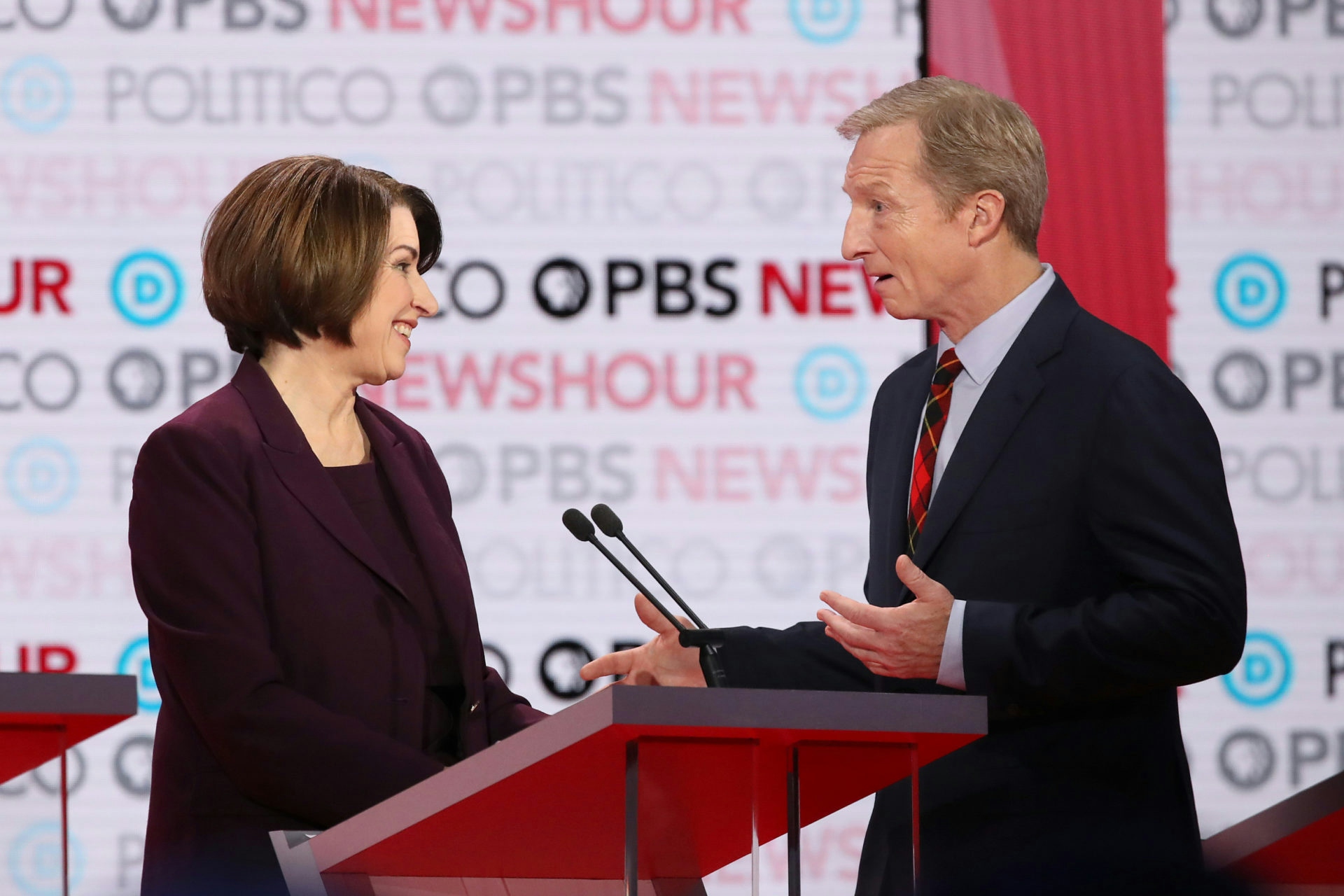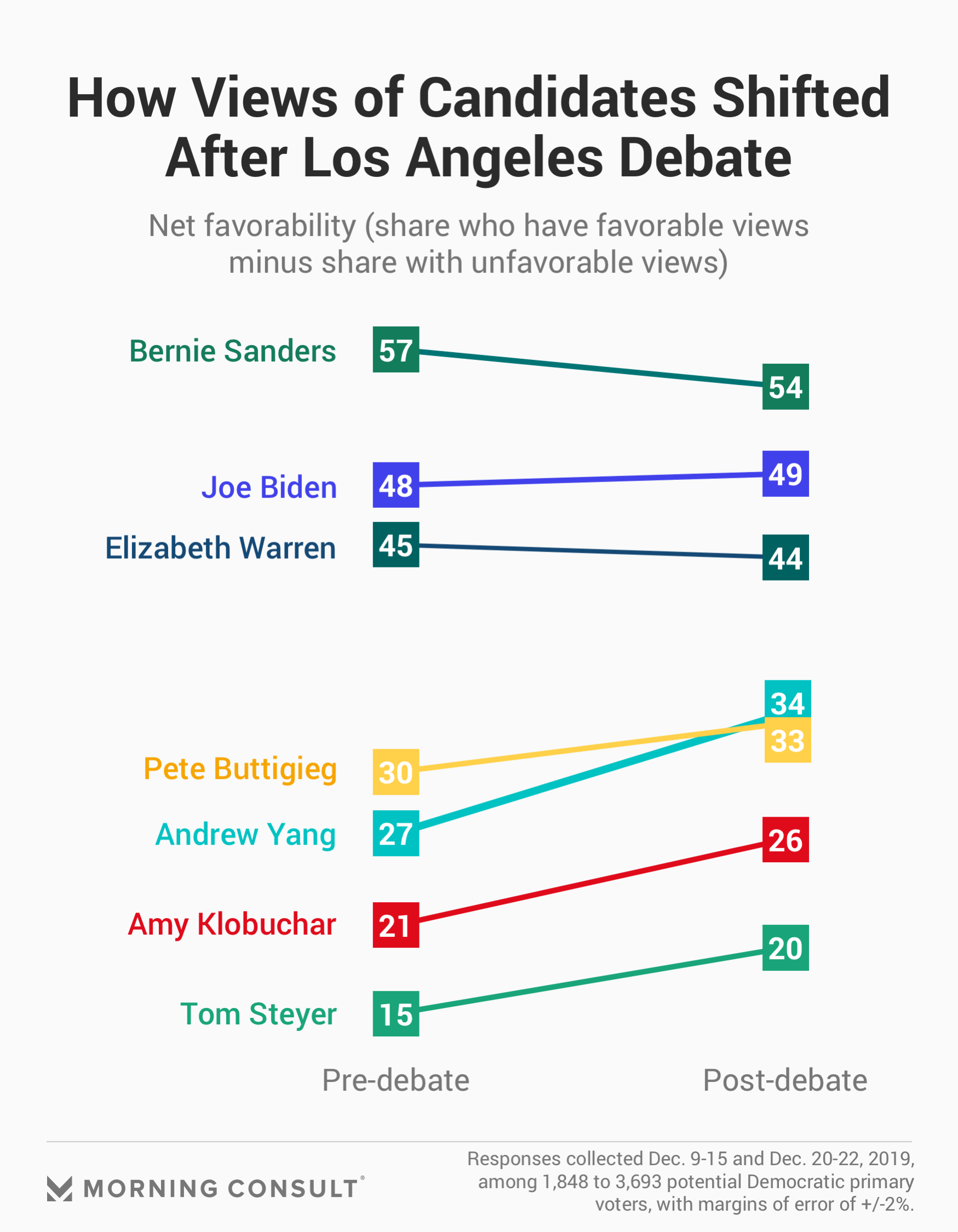Lesser-Known Democrats Seize Spotlight, Raise Profile With Los Angeles Debate

Key Takeaways
Andrew Yang’s net favorability improved 7 points among Democratic primary voters, followed by 5-point bumps for Sen. Amy Klobuchar and Tom Steyer.
Joe Biden remains the leader in national polling, with 31% backing the former vice president as their first choice and 21% preferring Sen. Bernie Sanders.
Rep. Tulsi Gabbard’s unfavorability rating rose 7 points to 30% in wake of her “present” vote on impeachment, making her the most-disliked candidate in the field.
The latest Democratic presidential debate left the national state of the race unaltered in the short term, new polling shows, but it did help some of the primary’s lesser-known candidates raise their profile with the electorate.

The first Morning Consult survey conducted after the Dec. 19 moderated discussion at Loyola Marymount University in Los Angeles found a handful of presidential hopefuls who are trailing the front-runners benefited from the smaller debate stage, improving their name recognition among Democratic primary voters as the first nominating contests draw nearer.
The biggest beneficiary of this dynamic was businessman Andrew Yang, whose net favorability -- the share of Democratic primary voters who view him favorably minus the share who view him unfavorably -- rose 7 percentage points among likely Democratic primary or caucus voters compared to a pre-debate poll conducted Dec. 9-15, with 47 percent expressing favorable views and 13 percent expressing unfavorable views.
Yang’s improvement was followed by Sen. Amy Klobuchar (D-Minn.) and California billionaire Tom Steyer, who each notched 5-point upticks in popularity.
Those rosier views did not prompt any voters to back a different horse, at least not yet. As he has throughout 2019, former Vice President Joe Biden leads the race, being the first choice of 31 percent of respondents in the latest poll, which was conducted Dec. 20-22 among 7,178 registered voters who indicated they may vote in a Democratic primary or caucus in their state. Sen. Bernie Sanders (I-Vt.) held his second-place spot with 21 percent, followed by Sen. Elizabeth Warren of Massachusetts (15 percent).
No candidate -- neither the seven who were on the debate stage nor the nine who were not -- saw their first-choice backing change outside the polls’ 1-point margins of error.
That includes South Bend Mayor Pete Buttigieg of Indiana, who faced attacks from Warren over his high-dollar fundraisers and from Klobuchar over a paucity of electoral victories. He remained in fourth place as the first choice of 9 percent of primary voters, 3 points ahead of billionaire and former New York City Mayor Mike Bloomberg, who was not on the debate stage. Buttigieg’s popularity also improved, with 50 percent expressing positive views and 17 percent expressing unfavorable views.
While many of the candidates in the field will be encouraged by their showing in the latest survey, it’s a different story for Rep. Tulsi Gabbard (D-Hawaii). Her widely covered decision to break with House Democrats on Dec. 18 and vote “present” on articles of impeachment against President Donald Trump was met by an 11-point drop in net favorability among Democratic primary voters. With an unfavorable rating of 30 percent and 18 percent expressing positive views of her, Gabbard is clearly the most-disliked candidate in the field.
Those rosier views did not prompt any voters to back a different horse, at least not yet. As he has throughout 2019, former Vice President Joe Biden leads the race, being the first choice of 31 percent of respondents in the latest poll, which was conducted Dec. 20-22 among 7,178 registered voters who indicated they may vote in a Democratic primary or caucus in their state. Sen. Bernie Sanders (I-Vt.) held his second-place spot with 21 percent, followed by Sen. Elizabeth Warren of Massachusetts (15 percent).
No candidate -- neither the seven who were on the debate stage nor the nine who were not -- saw their first-choice backing change outside the polls’ 1-point margins of error.
That includes South Bend Mayor Pete Buttigieg of Indiana, who faced attacks from Warren over his high-dollar fundraisers and from Klobuchar over a paucity of electoral victories. He remained in fourth place as the first choice of 9 percent of primary voters, 3 points ahead of billionaire and former New York City Mayor Mike Bloomberg, who was not on the debate stage. Buttigieg’s popularity also improved, with 50 percent expressing positive views and 17 percent expressing unfavorable views.
While many of the candidates in the field will be encouraged by their showing in the latest survey, it’s a different story for Rep. Tulsi Gabbard (D-Hawaii). Her widely covered decision to break with House Democrats on Dec. 18 and vote “present” on articles of impeachment against President Donald Trump was met by an 11-point drop in net favorability among Democratic primary voters. With an unfavorable rating of 30 percent and 18 percent expressing positive views of her, Gabbard is clearly the most-disliked candidate in the field.
Eli Yokley is Morning Consult’s U.S. politics analyst. Eli joined Morning Consult in 2016 from Roll Call, where he reported on House and Senate campaigns after five years of covering state-level politics in the Show Me State while studying at the University of Missouri in Columbia, including contributions to The New York Times, Politico and The Daily Beast. Follow him on Twitter @eyokley. Interested in connecting with Eli to discuss his analysis or for a media engagement or speaking opportunity? Email [email protected].